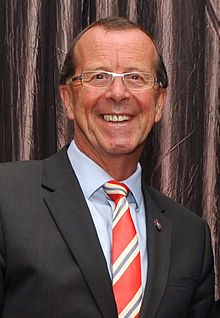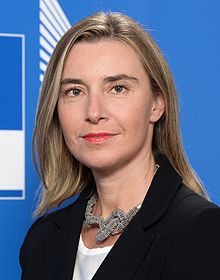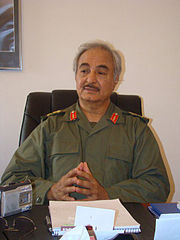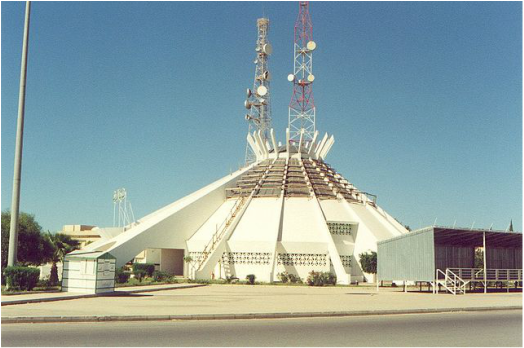 Martin Kobler UN SRSG Martin Kobler UN SRSG This is a commentary on some parts of the report presented to the UN Security Council on June 6 by Martin Kobler, Special Representative of the Secretary-General (SRSG). Kobler begins by outlining the dire humanitarian situation in Libya including 6,0000 families from Sirte fleeing their homes ahead of military operations there. He claims the number of displaced persons in Libya had reached 435,000 Kobler also makes reference to the immigrant situation, claiming that in May 1,100 migrants died in the Mediterranean. On the 26 May alone 500 migrants drowned off the Libyan coast. Although he mentions a shortage of health workers, essential medicines and supplies, he fails to note the lack of medical resources for treating those wounded in the fight against the Islamic State. On the political front he notes that it is almost six months since the Libya Political Agreement(LPA) was signed on December 17th in Skhirat. His description of the event is typical puffery: "The signing was the first time that the Libyan people had dared believe again that peace and unity in Libya were attainable." The Dialogue from which the LPA arose was meant to result in an agreement between the two rival parliaments. When neither would sign, Kobler simply gathered together all members of the Dialogue who agree to the draft agreement the UN had circulated and had them sign. None of those who signed from the two rival parliaments were authorized to do so. Details such as this never come up in UN reports. He claims that the people of Libya welcomed the Presidency Council (PC) of the GNA to Tripoli but this he admits stands in contrast to their present sense of growing impatience and concern. The capital and other places have been plagued by a cash crisis and also frequent power outages. The GNA has gone ahead without any formal vote of confidence in the HoR although Kobler and the GNA declared themselves up and operating from Tripoli on the basis of a letter from an alleged majority of the HoR approving the GNA in principle. Kobler also brought together members of the dialogue whom he claims gave a green light to move to Tripoli. Now all of a sudden Kobler admits that "Libya is without a formally endorsed government". He says it has failed because some of the parties to the agreement have failed to uphold their commitments. The HoR has never agreed to the LPA in the first place so it is difficult to see how they fail to uphold their commitments. The head of the HoR Ageela Saleh has nevertheless been sanctioned by the EU for obstructing the LPA process. He notes that the HoR has an integral role to play in Libya's democratic transition. The HoR under the terms of the LPA becomes the sole legislative body of the GNA. The GNA has been operating all along without a legislature. Somehow by hook or by crook the GNA must find a way to bring the HoR or more likely some of the members on board. Kobler had praise for international organizations such as the Arab League for supporting the GNA. In the case of the Arab League and some of its members such as the UAE and Egypt they support Haftar as well. Kobler ends by emphasizing six points necessary for Libya to exit from what he calls the current state of chaos. He claims: "First, that the Libyan Political Agreement, endorsed by the House of Representatives on 25 January, remains the sole legitimate framework for managing the remainder of Libya’s political transition until a permanent constitution is adopted." Yet on January 25th this year Reuters reports: " Libya's internationally recognized parliament voted on Monday to reject a unity government proposed under a United Nations-backed plan to resolve the country's political crisis and armed conflict." Whatever, Kobler meant to say what he does say is not true. Second, that the House of Representatives remains the institution to endorse and swear in the Government of National Accord. The HoR also needs to vote an amendment to the constitutional declaration of 2011. The GNA has long been operating without a formal vote of confidence from the HoR. The ministries have been operating as well without being sworn in. The real problem for the GNA is that the HoR is the legislature of the GNA. The GNA has been operating without a legislature. The fifth point that Kobler makes is that the PC is the sole legitimate recipient of international security assistance in its capacity of commander in chief. This statement is certain to anger Khalifa Haftar, commander in chief, of the Libyan National Army and his supporters. Haftar loyalists want him to remain as commander in chief of the army in the new government and Section 8 of the LPA which makes the PC commander in chief to be deleted. Sixth, averting hostilities between different security actors fighting against the Islamic state "requires an inclusive interim security arrangement, including temporary command and control arrangements for the army" However, at present there are mostly just various militia with various degrees of loyalty to the GNA. A regular GNA army is something to be formed rather than existing. Since Kobler's statement Solid Structure has entered the IS stronghold of Sirte and the Petroleum Facilities Guard is advancing from the east as well. While Khalifa Haftar announced weeks ago that he was marching to free Sirte, he has yet to take part in the battle for Sirte. He is busy attacking Derna with Operation Volcano and in Benghazi.
0 Comments
 Federica Mogherini Federica Mogherini Just one year after the EU received permission from the UN Security Council to stop human smuggling out of Libya, it now wants permission from the Council to block illegal arms shipments to the country. The EU top foreign policy official, Federica Mogherini, urged members to allow EU naval operations in the Mediterranean "to enforce the UN arms embargo on Libya by intercepting illegal arms shipments off the coast of Libya." Mogherini said: "Now once again, we are asking this council to adopt a resolution on authorizing Operation Sophia to enforce the U.N. arms embargo on the high seas off the coast of Libya. I can only hope that this council will once again do the right thing and help us make the Mediterranean a safer place for everyone." The embargo has been in place since 2011 during the campaign against Gadaffi. However, it is often violated. In the east, General Haftar appears to have received arms and vehicles from the UAE and perhaps Egypt. No doubt the Islamic State and other militias too also receive arms illegally. The existing naval effort called Operation Sophia would have its mission expanded from intercepting migrant boats to intercepting illegal weapons headed into Libya. The UN will probably allow exceptions to the embargo to allow arms and equipment to go to forces loyal to the Government of National Accord(GNA) who are fighting the Islamic State. However, the ban will still be in place for arms destined for General Khalifa Haftar and forces loyal to him and the Tobruk-based House of Representatives (HoR). No doubt he will be angry at the EU move. The EU request is expected to come up for a vote in mid-June. Mogherini said: “I can only hope that this Council will once again do the right thing and help us make the Mediterranean a safer place for everyone.” The PM of the GNA, Faiez Serraj said that the expanded mission for Operation Sophia would bolster his government since weapons come into Libya from the Mediterranean that often end up in the hands of militias beyond his control. While some no doubt go to the Islamic State, others may be going to Haftar who does not recognize the GNA and which the GNA cannot control. He refuses to join a unified command against the Islamic State as requested by the GNA. He also refuses a demand for a ceasefire in Benghazi. So far he has not attacked the Islamic State although he announced he was marching on Sirte weeks ago. Martin Kobler the Special Representative of the Secretary General (SRSG) told the Council that the number of weapons floating around in Libya was more than 3 times its population of six million. He said: “These weapons do not fall from the sky, but come in increasingly through illegal shipments by sea and by land. These shipments must end if there is to be any serious hope of bringing peace to Libya.” The Russian ambassador to the UN, Vitaly Churkin said that he had concerns about the way other groups in Libya might react to the Council measure, no doubt a reference to Haftar and his loyalists. Churkin said that Russia was not opposed to allowing Operation Sophia to search for illicit weapons but that they had to be careful about it: "Everything must be done in a way which does not create any suspicions among any of the Libyan parties." This suggests that the searches should be wary of ships going to areas controlled by the rival HoR government. Churkin said the highest priority should be to have the HoR approve the GNA which he said Russia expects soon. However, there has been no date or plans announced by the UN for such an event as yet. Earlier meetings to have a vote were either without a quorum or disrupted. The UN tried to arrange a meeting in the western city of Ghadames but it never took place. There was never an explanation as to why it did not happen. The plan was to have only members of the HoR present who supported the GNA in principle. Perhaps another attempt at this way to avoid having a full HoR meeting will happen soon.  General Khalifa Haftar General Khalifa Haftar Two armed groups formerly loyal to the commander in chief of the Libya National Army (LNA), General Khalifa Haftar, defected and pledged loyalty to the rival UN-backed Government of National Accord (GNA). The LNA are the armed forces of the Tobruk-based House of Representatives (HoR). Haftar rejects the UN-backed Libyan Government of National Accord (GNA), as does the HoR. The GNA has been trying to unify Libyan militia under one central command but Haftar has refused to join demanding GNA militias be disbanded. Many of the militia are regarded by Haftar as his enemies. Attempts by the GNA to unify the country have failed so far. The HoR is to be the legislature of the GNA according to the Libyan political agreement(LPA) but must first vote confidence in the GNA. This has not happened with all meetings so far either without a quorum or disrupted, with no vote. The two groups who decided to support the GNA are the special anti-terrorist force and a military intelligence unit. On Saturday the commanders of the two units held a joint news conference together with GNA Defence Minister Al-Mahdi al-Bargathi. Al-Bargathi is an opponent of Haftar even though he is in the LNA and the Haftar-led Operation Dignity. Originally it was reported that Haftar had demanded that Al-Barghathi return to Benghazi to lead Brigade 204 tanks which was formerly under his command. This was later denied by an LNA spokesperson. The head of the Petroleum Forces Guard (PFG) who guard several oil ports in the oil crescent, Ibrahim Jodhran, is also a foe of Haftar. The PFG have successfully launched an eastern front against the Islamic State. They have captured several towns and are advancing towards Sirte. Martin Kobler, the Special Representative of the Secretary-General (SRSG) has urged all the countries armed factions to unite. Haftar is adamantly opposed to uniting with militias he despises and losing his position as commander in chief. In response to the defections and attempts to extend the rule of the GNA to the east, the command of the Dignity Operation said that it would not allow any ministries that are part of the GNA to work in Benghazi before being approved by the HoR. The Minister of the Interior in the HoR government said that the "Special Tasks Force" had been cancelled and ordered that all its properties be transferred to the Ministry. Spokesperson of the General Command of the Armed Forces of the HoR, Ahmed Al-Mismari warned of people "who want to backstab the armed forces, security departments, and the volunteering fighters of Dignity Operation by extending their hands to “the fighters group and Muslims Brotherhood Group." The reference is to Islamist opponents of Haftar who support the GNA. The Special Tasks Forces was one of the forces that provided security for Al-Barghathi when he visited Benghazi. Al-Barghathi rejected the order of the HoR to dissolve the Special Missions Unit and the Security Backup Unit of military intelligence. He said the order was unjustified. He said he supports all the brigades and forces in Libya fighting IS in Sirte and elsewhere.  Sirte Assembly Building Sirte Assembly Building Troops loyal to the UN-brokered Government of National Accord(GNA) are advancing further into territory formerly controlled by the Islamic State in Libya (IS). On the western front, troops under the Al-Bunyan Al-Marsoos (Solid Structure) have advanced almost to Sirte and have captured the steam power plant on the outskirts of the city. Troops coming from the south have managed to control Jarif and surrounding area. In Sirte itself, the Islamic State closed down its courts days ago and IS fighters and police vanished from the streets. IS also closed down its radio station. The Solid Structure operations room announced that three of its forces had been killed and 20 injured during recent clashes. A recent tweet claims the city appears virtually empty. Seventy five have been reported killed since the operation against the Islamic State began. IS has mounted a number of suicide attacks using vehicles. On the eastern front, the Petroleum Facilities Guard (PFG) that are allied with the GNA took control of the town of Nawfiliva around 130 kilometers east from the IS stronghold of Sirte. They had captured the town of Ben Jawad further east earlier with the loss of five fighters. No troops were lost in taking Nawfiliva. A new operations room was established in the east to coordinate attacks. The PFG is an opponent of Haftar, the commander of the Libyan National Army (LNA) who does not recognize the GNA. The LNA is the armed forces of the HoR. The Special Representative of the Secretary-General, Martin Kobler, claimed that the various militia in the country must unite in order to defeat the Islamic State or Daesh as he likes to call it. Kobler said at a meeting with French Foreign Minister Jean-Marc Ayrault that a united command structure was needed under the control of Faiez Serraj the PM of the GNA. Kobler said: “One point must be very clear. The fight against Daesh must first be a Libyan fight and a united fight.” He said nobody acting alone will succeed and security actors in the west and east must unite their forces under a joint command structure under the GNA. Ayrault said that the priority was to incorporate General Haftar who heads the LNA with western militias. There is absolutely no sign that this will happen. Haftar has claimed it is unthinkable for him to join GNA forces until all the militias aligned with the GNA were disbanded. This is not likely to happen any time soon since the GNA relies on the militia for security. Kobler said that he has tried to hold talks with Haftar but Haftar refused. The attacks on IS from the east and the west and also the south have greatly reduced the area held by the IS and brought the Misrata militia on the western front to the outskirts of Sirte. It seems quite possible for the Islamic State to be defeated without Haftar agreeing to a unified command under the GNA. Haftar launched his own march towards Sirte weeks ago but for some reason has not attacked them at all. Instead he has launched Operation Volcano against the Shura Council of Derna who were actually instrumental in driving IS out of the city. Kobler's waiting for Haftar to join a unified command makes little sense, when the present forces appear strong enough to defeat IS, especially if the west provides them with more arms and ammunition. Already, UK special forces appear to be helping on the western front. |
Like this writer's work please donate:
Ken Hanly
Ken is a retired philosophy professor living in the boondocks of Manitoba, Canada, with his Filipina wife. He enjoys reading the news and writing articles. Politically Ken is on the far left of the political spectrum on many issues.
Archives
November 2016
Categories
All
|
 RSS Feed
RSS Feed

